When it comes to the world of ecommerce, there are lots of exciting opportunities, but it can be scary for beginners. Developing unique products, managing inventory, and building a strong brand may seem almost impossible.
White labeling ecommerce can be an attractive alternative since it offers a streamlined path to success. This is when you sell generic products that are manufactured by a third party, but you add your own branding to them.
Here at WPBeginner, we have tons of experience in ecommerce strategy and have been studying the rise of white labeling. Our team of experts understands the unique challenges that you’ll face as a beginner in the world of online retail.
In this comprehensive guide, we will explain what white labeling is, its benefits and drawbacks, tips for using it, and much more. That way, you will be able to launch your own branded online store in no time.
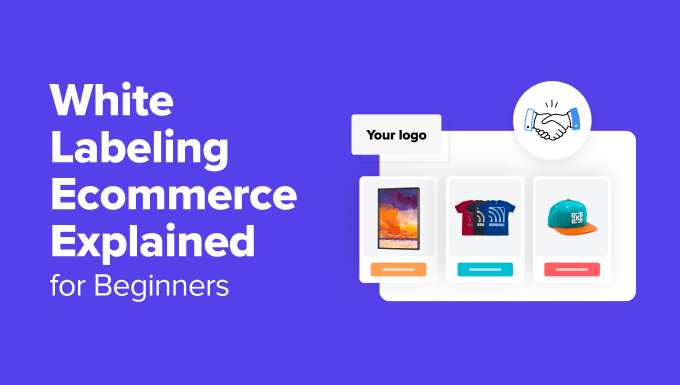
Here is a quick overview of the topics we will cover in this guide:
What is White Labeling Ecommerce?
White labeling means that one company manufactures generic products, and then other companies can sell them under their own brand name. With this business model, each product can have a different name, packaging, or price and be sold under different brands. But apart from that, these duplicate products will be identical.
This allows beginners to launch online stores without a sizeable investment in product development. With white labeling, you won’t even have to worry about managing inventories.
For example, you may want to launch a skincare line but not have the resources or time to do so.
In that case, you can partner with a wholesale skincare company that will manufacture products for you, according to a contract. You can personalize these products by adding your own packaging and brand name. Then, you can sell them in your online store.
Another example of white labeling in ecommerce is print-on-demand (POD) shops, where you can design a shirt and add it to your online store without spending a penny.
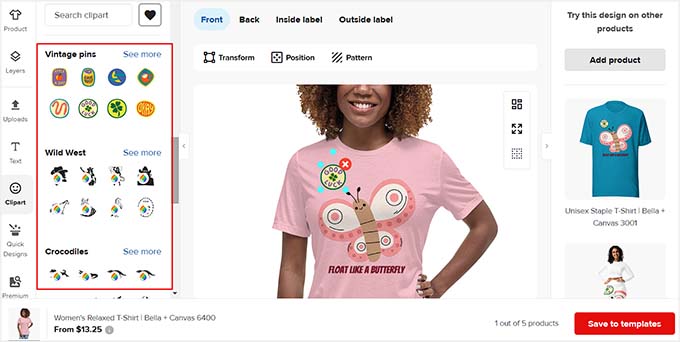

Now, when a user places an order, the POD platform automatically prints the shirt and sends it to the customer’s address, charging a small fee for it.
This reduces financial risk and provides an easy way to make money online.
Ecommerce Niches That Use White Label Products
White labeling in ecommerce is widely used across different industries. It’s mostly popular in sectors where manufacturing products is a bit difficult or more expensive, but that’s not always the case.
Now, let’s talk more about the ecommerce niches that often use white-labeled products. These examples might give you some ideas for your own store.
Web Development
White labeling is super popular in web development agencies. Many of these businesses partner with white-label companies to offer services for digital marketing, maintenance, hacked site repair, or speed optimization under their own brand name.
Once these companies receive a client’s project, they pass that information to third-party freelancers or white-label partners like Seahawk Media or Codeable.
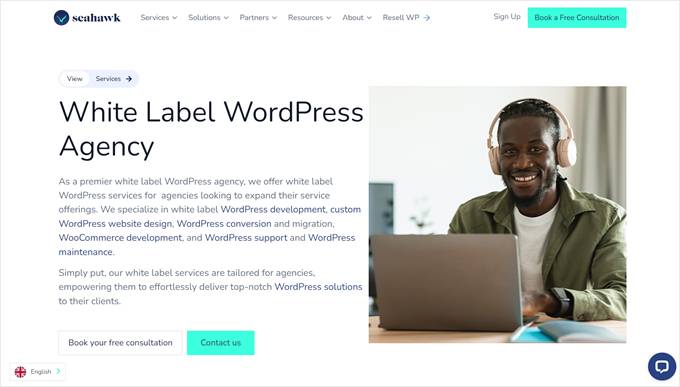

Then, they will build the website or perform other tasks while the development agency handles the customer relationship.
For more details on this niche, see our tutorial on how to white label WordPress development for digital agencies.
Fashion and Clothing
Clothing is another popular ecommerce sector for white labeling products. It allows retailers to offer a variety of clothing items and accessories without dealing with the full cost of manufacturing.
Many popular brands like Zara and H&M use this approach to rapidly adopt fashion trends. If you are a beginner looking to start your own clothing store using white-label products, then you can use a tool like Spreadshirt.
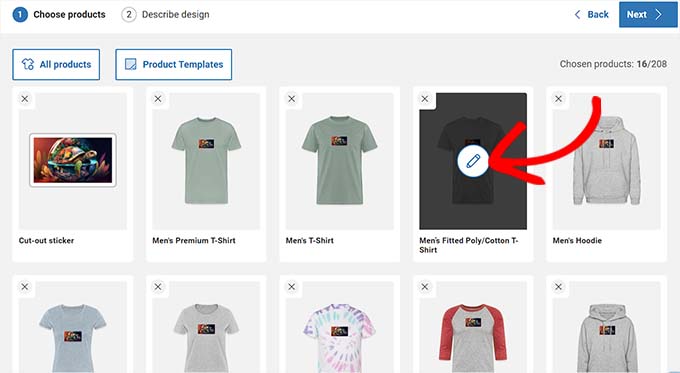

It is a popular platform that allows users to design their own clothing items and add them to their online store. Once someone places an order, Spreadshirt will handle the inventory, payments, printing, and shipping.
For more about this niche, see our beginner’s guide on how to easily create a t-shirt shop in WordPress.
Electronics
It can be challenging for small businesses to keep up with the rapid pace of innovation in the tech industry. This is where white-labeled electronics come in.


Thanks to white labeling, small online stores can offer popular tech accessories like phone cases, keyboards, headphones, or even portable speakers under their own brand.
This can help them stay competitive without the burden of complex electronics manufacturing.
Cosmetics and Skincare
The skincare and cosmetics industry uses white-label products to cater to the specific needs of the target audience.
For instance, a cosmetics brand might focus on organic beauty products by white labeling premade items that align with their brand values.


Similarly, many popular skincare brands source products from the same manufacturer and then rebrand and sell them with different names.
Home and Personal Care
Home and personal care items also have a lot of potential for white labeling. You can sell common products like cleaning supplies and kitchenware.
Since many consumers aren’t loyal to specific brands in these niches, it might be easier to win them over.


In reality, some of these products have been manufactured by the same company but are being sold with different names and brand logos.
Benefits of White Labeling Ecommerce
White labeling offers a convenient way for beginners to enter the ecommerce market and create their own brands. Here are some key benefits to consider when opting for this approach for your online store.
Reduced Cost: White labeling ecommerce is cost-effective because you don’t have to pay manufacturing or product development costs. You won’t need to invest in equipment, materials, or production facilities. Plus, some white-label providers handle inventory and order fulfillment, further reducing expenses.
Easy Store Launch: You can launch your store in just a few minutes since the products are readily available. This eliminates the need to spend time designing or prototyping.
Wider Product Selection: As a small business owner, you can still offer a broad range of products without the burden of large-scale manufacturing. This lets you cater to a wider audience, test different product lines, and increase sales.
Scalability: White labeling is also super scalable. You can easily add new white-labeled products as your customer base grows or market trends evolve. This flexibility allows you to expand your product lines without much investment.
Focus on Marketing: Since you are outsourcing product development, you have more time to build a strong brand identity. You can use effective marketing tips and build an email list to bring back customers.
Drawbacks of White Labeling Ecommerce
While white labeling has a lot of advantages, it is still important to consider some cons before you choose this approach.
Limited Control Over Quality: When selling white-label products, you don’t have as much control over their quality. That’s because you won’t be in charge of development and manufacturing. This can directly impact customer satisfaction and your reputation.
Reduced Profit Margins: Since white-label products are often manufactured in bulk and are being sold with different names, competition can be fierce. This can lead to lower profit margins, as businesses need to offer competitive pricing to attract customers.
Potential for Reliance on Supplier: Your business will become heavily dependent on the white-label company that you have partnered with for product quality, consistency, and timely delivery.
Of course, if you are aware of these drawbacks, you will be better able to minimize them. For example, to make sure you are selling high-quality products, you can always test them yourself first.
White Label Products to Sell Online
Now, let’s go over a few examples of commonly white-labeled products. If you choose some of these popular items, it may help maximize conversions in your ecommerce store.
Reusable Water Bottles
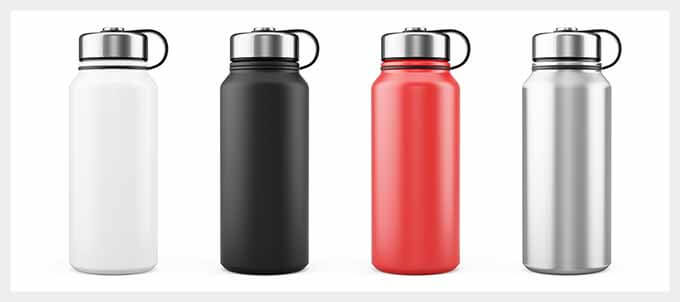

With the growing demand for sustainable products, selling reusable water bottles can be a great idea.
They are low-cost white-label products, so they may be easier to sell. Plus, you can add your own designs or brand logo.
For instance, if you have a gym or fitness site, then you can sell reusable water bottles to your customers.
Coffee Beans


Coffee beans are another great option when it comes to white labeling. A number of retailers and small businesses buy identical coffee beans from the same manufacturer and sell them with their own branding.
You can also partner with a local coffee shop to sell your beans in person. This can also help you build brand awareness and win leads.
Pet Accessories


The pet industry is booming, so there’s a high demand for pet accessories and toys. You can take advantage of this popular ecommerce niche by selling dog beds, cat toys, collars, and other items in your online pet store.
You can also add categories for food and grooming items, offering a curated selection that aligns with your brand.
Phone Accessories
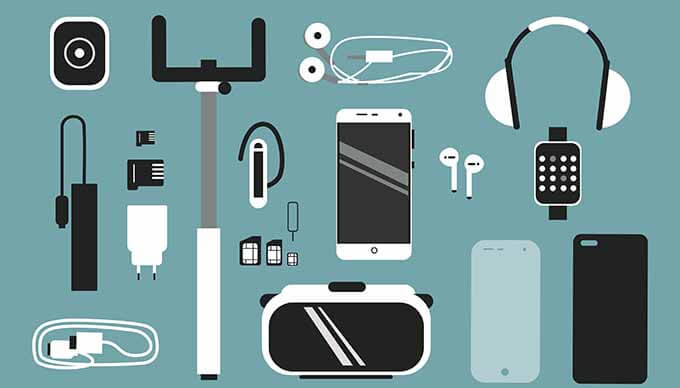

You might also want to consider offering white-labeled phone accessories. You can sell customized phone cases, car mounts, selfie sticks, waterproof pouches, chargers, and so much more.
You can personalize them with your brand logo, unique designs, or trending patterns. This way, you can make them stand out in a crowded market.
Food Supplements


If you run a health website or food blog, then you might want to start selling white label food supplements like vitamins, proteins, minerals, or probiotics.
You can simply add your own branding to your products and promote them in your recipe blog posts. This will encourage users to check out your supplements, helping you earn some additional money.
Home Decor


Another popular white-label niche is home decor. You can sell wall art, lamps, fridge magnets, stickers, bedsheets, and many other items.
You can also add more products as your store grows and customize them with your designs or logo.
Top Three White Label Product Suppliers
Here are some well-known suppliers where you can order white-label products in bulk.
If you’d like a more in-depth review of these white-label suppliers, then keep reading.
1. Alibaba


Alibaba is the world’s largest B2B online marketplace, where businesses can find manufacturers, wholesalers, and suppliers for a wide range of products.
It offers a huge selection of white-label items from around the globe and connects you with tons of suppliers. You can compare prices, product specifications, and minimum order quantities.
Alibaba usually offers products in bulk, which lets them sell products at a lower per unit cost than other vendors.
Pros
The marketplace also offers dropshipping. This allows you to send the product directly to your customer’s address from Alibaba.
It offers branded packaging and logos for white-labeled products.
You can add custom invoices for your customers.
Cons
Many Alibaba suppliers have minimum order quantities that you need to meet. This can be a challenge if you have limited inventory needs.
You will need to evaluate the potential product suppliers yourself.
Why we recommend Alibaba: If you plan to order white label products in bulk, then Alibaba is a great choice for you.
2. Maker’s Row
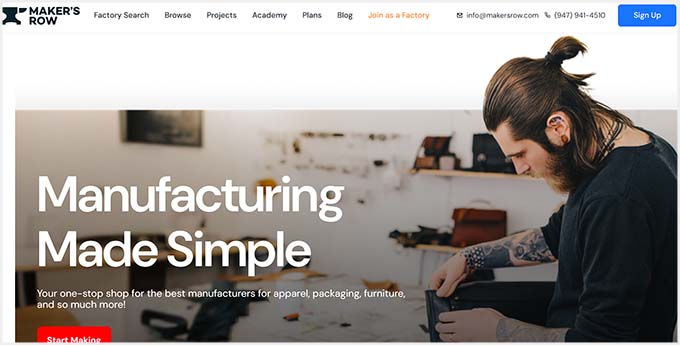

Maker’s Row is an amazing platform that connects small businesses with manufacturers. It does not offer any white-label service itself, but you can find different suppliers who will send white-label products your way.
You can post project requests, receive quotes, and collaborate with manufacturers directly through the platform. Plus, you can use search filters to narrow down suppliers based on your product category, location, minimum order requirements, and white labeling capabilities.
Once you have selected a supplier, you can talk with them using the Maker’s Row platform. This way, you can easily ask them questions about their white labeling process.
Pros
Maker’s Row evaluates manufacturers to ensure quality and legitimacy.
It comes with excellent features to streamline communication and project management.
The platform has educational resources for ecommerce and white labeling.
Cons
Compared to other marketplaces, it provides a limited product variety.
Maker’s Row only focuses on American manufacturers. This can be a problem if you are in any other part of the world.
Why we recommend Maker’s Row: If you live in the USA and want to sell white label products, then Maker’s Row is the best solution.
3. BigBuy
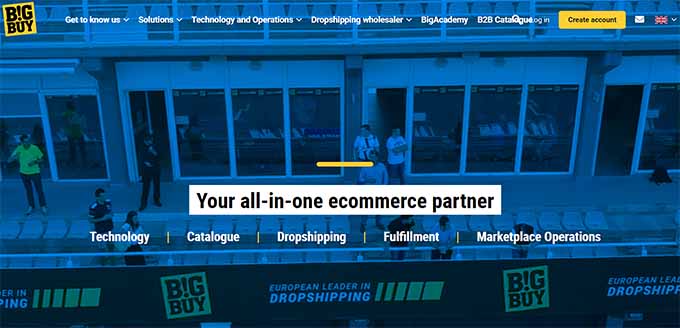

BigBuy is a European ecommerce store that also focuses on wholesalers and dropshipping.
It has a wide range of products across various categories like clothing, electronics, homeware, and more. These products can be purchased and then white labeled with your own branding elements.
A huge benefit of opting for this platform is that BigBuy does not set a minimum order limit. This makes it easier to buy white-label products in smaller numbers.
Pros
It offers branded packaging with your logo.
You can also send customized invoices to customers.
Some BigBuy suppliers offer extensive customization options for the product itself.
Cons
Products on BigBuy are slightly more expensive than other vendors.
You will need to pay an additional dropshipping fee.
Why we recommend BigBuy: If you have a small store and want to order a small number of white label products, then BigBuy is a good choice.
How to Get Started with Ecommerce White Labeling
Now that you know how ecommerce white labeling works, you may be wondering how to launch an online store to sell white-labeled products. The best and quickest way to do this is using WordPress and WooCommerce.
First, you will need to choose a hosting provider to get the resources your website needs. Ideally, you’ll want to pick a web host that comes with a free domain name so you can keep costs low.
SiteGround is one of the best WooCommerce hosting providers. They are a great option if you are looking for a high-performance yet affordable managed hosting provider. Plus, they offer a big discount for WPBeginner customers.
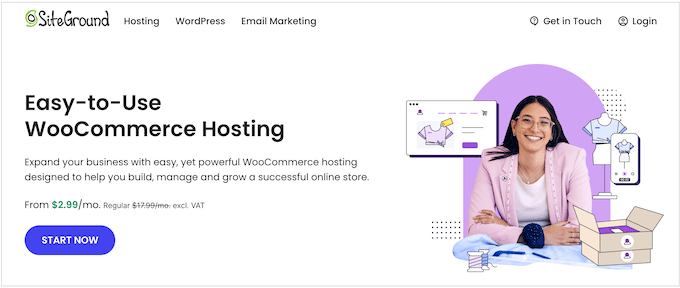

For more details about launching your online business, you can check out our complete guide on how to set up a WooCommerce store.
Frequently Asked Questions About Ecommerce White Labeling
Here are some questions that our readers frequently ask about white labeling ecommerce.
What is the difference between a white label and a black label?
With white labeling, third-party vendors supply businesses with items to sell in their own stores. These vendors allow companies to add their original branding and logo to the item, but it does not literally have a white label on it.
Meanwhile, companies sometimes add an actual black label to their higher-end or luxury products, making them distinct from regular items.
How can I start selling white-label products?
To start selling white-label products, you need to choose a niche or product category for your store. You’ll also have to create a unique brand identity and logo. Once you do that, you can build your store in WordPress.
Then, find a reliable supplier and select some items to add to your catalog. After that, we would recommend focusing on a marketing strategy to promote your products and generate more conversions.
Is white labeling right for my ecommerce business?
White labeling can be a good option for businesses looking to enter a market quickly or those with a smaller budget. However, it’s important to weigh the pros and cons carefully and consider your specific business goals and resources.
If you expect high profit margins, extensive product customization options, or tight quality control, then white labeling might not be the best fit.
On the other hand, if you are looking for an easy way to sell products without worrying about inventory or shipping, then white labeling may be perfect for you.
We hope this article helped you learn what you need to know about white labeling for ecommerce. You may also want to see our beginner’s guide on WooCommerce made simple and our top picks for the best WordPress dropshipping plugins.
If you liked this article, then please subscribe to our YouTube Channel for WordPress video tutorials. You can also find us on Twitter and Facebook.


